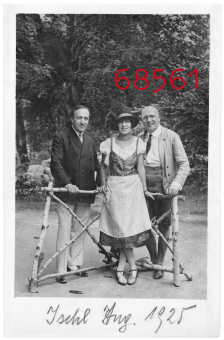Fritz Löhner-Beda (1883–1942)

and his father-in-law, Jakob Jelllinek (left),
Bad Ischl, 1925
© Jack Jellins
Buchenwald Song
When the day awakes, before the sun laughs,
the columns move out
into the dawning morning, to start the day's labors…
And the forest is black and the sky is red,
and we carry a crust of bread in our breadsacks and in our hearts,
in our hearts we carry our sorrows.
Keep in step, comrade, and don't be disheartened,
for we carry the will to live in our blood,
and in our hearts, in our hearts we carry faith.
O Buchenwald, I can't forget you,
because you are my fate.
Only those who have left you
can appreciate how wonderful freedom is.
O Buchenwald, we don't complain and wail,
and whatever our future may be,
we still will say Yes to life,
for someday the day will come when we are free."
Buna Song
When Luna still smiles in the sky,
the Buna camp awakens,
the Silesian sun rises,
and the work column marches out.
And with them goes homesickness, at every step,
and the heavy sorrow of these hard times,
but work is beckoning
and the song rings out:
It’s only work that makes us free,
and makes our sorrows disappear,
only work that lets us forget
all that once was ours.
It’s only work that makes us tough,
when fate has made us fools,
and time goes by and sorrow is gone with the wind,
only the work of our hands lives on.
Fritz Löhner-Beda was born as Friedrich Löwy in Wildenschwert/Usti nad Orlici in Bohemia on June 24, 1883. In 1888, the family moved to Vienna and changed its name to Löhner; many of his early works—sketches, satires, and hit songs—were signed “Beda,” a nickname for Bedřich (Czech for “Friedrich”). Löhner-Beda had studied law at the University of Vienna, received his doctorate, and then worked for a while in a law office, but his real interests were music, poetry, and the cabaret. In the 1910s and 1920s, Fritz Löhner-Beda developed into one of Vienna’s best-known writers of popular song lyrics (for example, “Ich hab’ mein Herz in Heidelberg verloren”) and operetta librettists. He worked closely with Franz Léhar, for whom he wrote, among other things, the libretto for Land des Lächelns (The Land of Smiles) (1929). In 1919, his son Bruno was born, the product of a relationship with Anni Strassmann; Bruno was able to immigrate to the United States in the 1930s. In 1925, Fritz Löhner-Beda married Helene Jellinek, and Liselotte was born in 1927, Evamaria, in 1929.
After the Anschluss of Austria, Fritz Löhner-Beda was quickly shut out of the Austrian music scene, and many of his non-Jewish friends and colleagues distanced themselves from him. Léhar did nothing to help Löhner-Beda, who was arrested in Vienna on March 13, 1938, and deported to the Dachau concentration camp on April 1, 1938; indeed, he curried favor with the Nazi powers-that-be in the following years. On September 23, 1938, Fritz Löhner-Beda was deported from Dachau to the Buchenwald concentration camp, where, along with Hermann Leopoldi, he wrote the “Buchenwald Song.” On August 31, 1942, his wife, Helene, and daughters, Liselotte and Evamaria, now 13 and 14 years old, were deported from Vienna to Minsk, where they were murdered in specially altered gas vans. On October 17, 1942, Fritz Löhner-Beda and many other prisoners were deported to Auschwitz, where he was made to do forced labor for I.G. Farben, helping in the building of its Buna plant. There he wrote the “Buna Song.” After only a few weeks, however, Fritz Löhner-Beda no longer seemed “fit for work” in the opinion of the I.G. Farben directors. In the I.G. Farben trial in Nuremberg, his fellow prisoner Raymond van den Stratt spoke about his death on December 4, 1942:
“One day, two Buna inmates, Dr. Raymond van den Straaten and Dr. Fritz Löhner-Beda, were going about their work when a party of visiting I.G. Farben dignitaries passed by. One of the directors pointed to Dr. Löhner-Beda and said to his SS companion, ‘This Jewish swine could work a little faster.’ Another director then chanced the remark, ‘If they can’t work, let them perish in the gas chamber.’ After the inspection was over, Dr. Löhner-Beda was pulled out of the work party and was beaten and kicked until, a dying man, he was left in the arms of his inmate friend, to end his life in I.G. Auschwitz.”[1]
By 1945, Léhar operettas with libretti by Fritz Löhner-Beda were being staged once again in Vienna, but as was the case with the performances in the Nazi era, the librettist frequently goes unacknowledged in the program booklets, nor is there any mention of his death.
(MN; transl. KL)
















